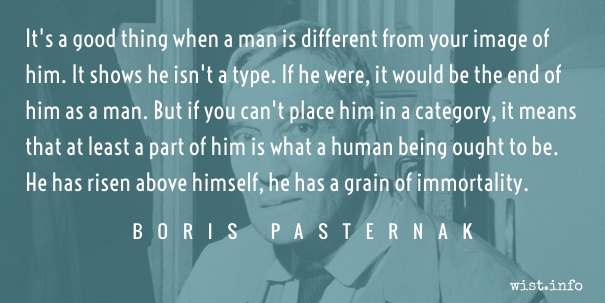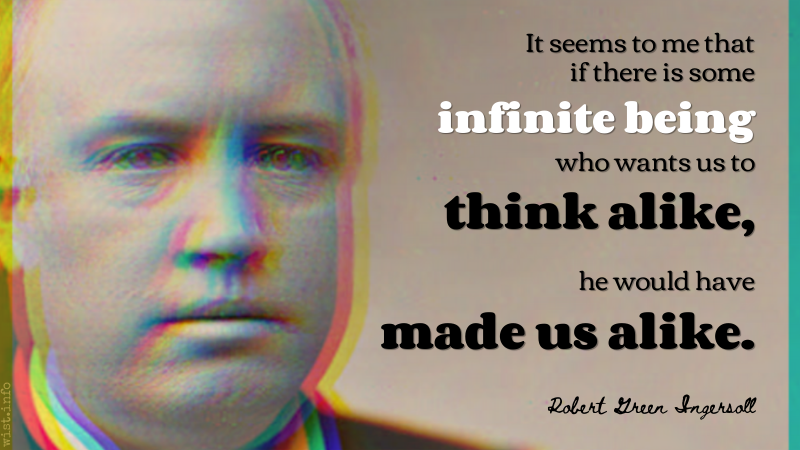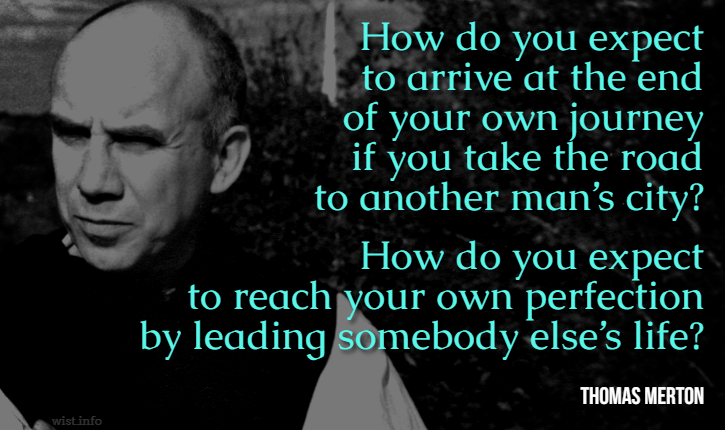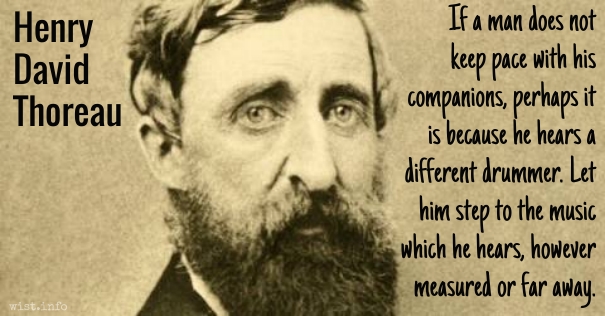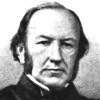The greatest thing in the world is to know how to belong to oneself.
[La plus grande chose du monde c’est de sçavoir estre à soy.]
Michel de Montaigne (1533-1592) French essayist
Essays, Book 1, ch. 38 (1.38), “Of Solitude [De la solitude]” (1572) [tr. Frame (1943), 1.39]
(Source)
Present in the 1st (1580) edition.
Some translators use the 1588 sequence of chapters, not the 1595, and so identify this as ch. 39.
(Source (French)). Alternate translations:The greatest thing of the world, is for a man to know how to be his owne.
[tr. Florio (1603)]The greatest thing in the world is for a person to know that he is his own master.
[tr. Cotton (1686)]The greatest thing in the world is for a man to know that he is his own.
[tr. Cotton/Hazlitt (1877)]The greatest thing in the world is to know how to belong to oneself.
[tr. Ives (1925), 1.39]The greatest thing in the world is to know how to be oneself.
[ed. Rat (1958), 1.39]The greatest thing in the world is to know how to live to yourself
[tr. Screech (1987)]The greatest thing in the world is to know how to belong to oneself.
[tr. Atkinson/Sices (2012)]
Quotations about:
individuality
Note not all quotations have been tagged, so Search may find additional quotes on this topic.
Is it desirable that all should be exactly alike in their religious convictions? Is any such thing possible? Do we not know that there are no two persons alike in the whole world? No two, trees, no two leaves, no two anythings that are alike? Infinite diversity is the law. Religion tries to force all minds into one mould. Knowing that all cannot believe, the church endeavors to make all say they believe. She longs for the unity of hypocrisy, and detests the splendid diversity of individuality and freedom.
Robert Green Ingersoll (1833-1899) American lawyer, freethinker, orator
Lecture (1873-12) “Individuality,” Chicago Free Religious Society
(Source)
Full title "Arraignment of the Church and a Plea for Individuality." Collected in The Gods and Other Lectures (1876).
When a fact can be demonstrated, force is unnecessary; when it cannot be demonstrated, an appeal to force is infamous. In the presence of the unknown all have an equal right to think.
Robert Green Ingersoll (1833-1899) American lawyer, freethinker, orator
Lecture (1873-12) “Individuality,” Chicago Free Religious Society
(Source)
Full title "Arraignment of the Church and a Plea for Individuality." Collected in The Gods and Other Lectures (1876).
Whoever worships, abdicates. Whoever believes at the command of power, tramples his own individuality beneath his feet, and voluntarily robs himself of all that renders man superior to the brute.
Robert Green Ingersoll (1833-1899) American lawyer, freethinker, orator
Lecture (1873-12) “Individuality,” Chicago Free Religious Society
(Source)
Full title "Arraignment of the Church and a Plea for Individuality." Collected in The Gods and Other Lectures (1876).
Any collocation of persons, no matter how numerous, how scant, how even their homogeneity, how firmly they profess common doctrine, will presently reveal themselves to consist of smaller groups espousing variant versions of the common creed; and these sub-groups will manifest sub-sub-groups, and so to the final limit of the single individual, and even in this single person conflicting tendencies will express themselves.
Jack Vance (1916-2013) American writer [John Holbrook Vance]
The Languages of Pao, ch. 5, epigraph (1958)
(Source)
The epigraph is attributed to the fictional Adam Ostwald, in his book Human Society.
First published in Satellite Science Fiction magazine (1957-12).
It’s a good thing when a man is different from your image of him. It shows he isn’t a type. If he were, it would be the end of him as a man. But if you can’t place him in a category, it means that at least a part of him is what a human being ought to be. He has risen above himself, he has a grain of immortality.
Boris Pasternak (1890-1960) Russian poet, novelist, and literary translator
Doctor Zhivago [До́ктор Жива́го], Part 2, ch. 9 “Varykino,” sec. 4 [Yuri] (1955) [tr. Hayward & Harari (1958), US ed.]
(Source)
Alternate translations:It’s a good thing when a man is different from your image of him. It shows he isn’t a type. If he were, it would be the end of him as a man. But if you can’t place him in a category, it means that at least a part of him is what a human being ought to be. He has a grain of immortality.
[tr. Hayward & Harari (1958), UK ed.]It’s good when a man deceives your expectations, when he doesn’t correspond to the preconceived notion of him. To belong to a type is the end of a man, his condemnation. If he doesn’t fall under any category, if he’s not representative, half of what’s demanded of him is there. He’s free of himself, he has achieved a grain of immortality.
[tr. Pevear & Volokhonsky (2010)]
It is erroneous to tie down individual genius to ideal models. Each person should do that, not which is best in itself, even supposing this could be known, but that which he can do best, which he will find out if left to himself. Spenser could not have written Paradise Lost, nor Milton the Faerie Queene. Those who aim at faultless regularity will only produce mediocrity, and no one ever approaches perfection except by stealth, and unknown to themselves.
William Hazlitt (1778-1830) English writer
“Thoughts on Taste,” Edinburgh Magazine (1819-07)
(Source)
When the whole world is running towards a cliff, he who is running in the opposite direction appears to have lost his mind.
Mature people relate to each other without the need to merge.
Life beats down and crushes the soul, and art reminds you that you have one.
Stella Adler (1901-1992) American actor and acting teacher
Quoted in Barry Paris, ed., Stella Adler on America’s Master Playwrights, Introduction (2012)
(Source)
That man’s best works should be such bungling imitations of Nature’s infinite perfection, matters not much; but that he should make himself an imitation, this is the fact which Nature moans over, and deprecates beseechingly. Be spontaneous, be truthful, be free, and thus be individuals! is the song she sings through warbling birds, and whispering pines, and roaring waves, and screeching winds.
Lydia Maria Child (1802-1880) American abolitionist, activist, journalist, suffragist
Letters from New-York, # 38, 1843-03-17 (1843)
(Source)
Children in a family are like flowers in a bouquet: there’s always one determined to face in an opposite direction from the way the arranger desires.
Marcelene Cox (1900-1998) American writer, columnist, aphorist
“Ask Any Woman” column, Ladies’ Home Journal (1956-09)
(Source)
A State which dwarfs its men, in order that they may be more docile instruments in its hands even for beneficial purposes — will find that with small men no great thing can really be accomplished; and that the perfection of machinery to which it has sacrificed everything, will in the end avail it nothing, for want of the vital power which, in order that the machine might work more smoothly, it has preferred to banish.
John Stuart Mill (1806-1873) English philosopher and economist
On Liberty, ch. 5 “Applications” (1859)
(Source)
Closing words of the book.
KEATING: Boys, you must strive to find your own voice. Because the longer you wait to begin, the less likely you are to find it at all. Thoreau said, “Most men lead lives of quiet desperation.” Don’t be resigned to that. Break out! Break out!
In an age where there is much talk about “being yourself” I reserve to myself the right to forget about being myself, since in any case there is very little chance of my being anybody else. Rather it seems to me that when one is too intent on “being himself” he runs the risk of impersonating a shadow.
Thomas Merton (1915-1968) French-American religious and writer [a.k.a. Fr. M. Louis]
“Day of a Stranger,” The Hudson Review (Summer 1967)
(Source)
Democracy will win — because a government’s legitimacy can only come from citizens; because in this age of information and empowerment, people want more control over their lives, not less; and because, more than any other form of government ever devised, only democracy, rooted in the sanctity of the individual, can deliver real progress.
Barack Obama (b. 1961) American politician, US President (2009-2017)
Speech, Nordea Concert Hall, Tallinn, Estonia (3 Sep 2014)
(Source)
Precisely because the tyranny of opinion is such as to make eccentricity a reproach, it is desirable, in order to break through that tyranny, that people should be eccentric. Eccentricity has always abounded when and where strength of character has abounded; and the amount of eccentricity in a society has generally been proportional to the amount of genius, mental vigor, and more courage it contained. That so few dare to be eccentric marks the chief danger of the time.
John Stuart Mill (1806-1873) English philosopher and economist
On Liberty, ch. 3 “Of Individuality, as One of the Elements of Well-Being” (1859)
(Source)
Any social organization does well enough if it isn’t rigid. The framework doesn’t matter as long as there is enough looseness to permit that one man in a multitude to display his genius. Most so-called social scientists seem to think that organization is everything. It is almost nothing — except when it is a straitjacket. It is the incidence of heroes that counts, not the pattern of zeros.
It seems to me that if there is some infinite being who wants us to think alike, he would have made us alike.
Robert Green Ingersoll (1833-1899) American lawyer, freethinker, orator
Speech to the Jury, Trial of C. B. Reynolds for Blasphemy, Morristown, New Jersey (May 1887)
(Source)
A person, an individual being, has a thousand ways of conveying his feelings and thoughts. He is riches without end, he is a world in which we can always discover something new. A crowd, on the other hand, reduces the individuality of the person; a man in a crowd limits himself to a few forms of elementary behavior. The forms through which a crowd can express its yearnings are extraordinarily meager and continually repeat themselves: the demonstration, the strike, the rally, the barricades. That is why you can write a novel about a man, but about a crowd — never.
Ryszard Kapuściński (1932-2007) Polish journalist, photographer, poet, author
Shah of Shahs, Part 3 “The Dead Flame” (1982)
(Source)
You submit to tyranny when you renounce the difference between what you want to hear and what is actually the case. This renunciation of reality can feel natural and pleasant, but the result is your demise as an individual — and thus the collapse of any political system that depends upon individualism.
Timothy Snyder (b. 1969) American historian, author
On Tyranny: Twenty Lessons from the Twentieth Century (2017)
(Source)
The surest defense against Evil is extreme individualism, originality of thinking, whimsicality, even — if you will — eccentricity. That is, something that can’t be feigned, faked, imitated; something even a seasoned imposter couldn’t be happy with. Something, in other words, that can’t be shared, like your own skin: not even by a minority. Evil is a sucker for solidity. It always goes for big numbers, for confident granite, for ideological purity, for drilled armies and balanced sheets. Its proclivity for such things has to do with its innate insecurity, but this realization, again, is of small comfort when Evil triumphs.
Joseph Brodsky (1940-1996) Russian-American poet, essayist, Nobel laureate, US Poet Laureate [Iosif Aleksandrovič Brodskij]
Commencement Address, Williams College (24 May 1984)
(Source)
The only reason why we wish to exchange thoughts is that we are different. If we were all the same, we would die dumb. No thought would be expressed after we found that our thoughts were precisely alike. We differ — our thoughts are different. Therefore the commerce that we call conversation.
Robert Green Ingersoll (1833-1899) American lawyer, freethinker, orator
“The Limits of Toleration,” Speech, Nineteenth Century Club of New York (8 May 1888)
(Source)
I see men assassinated around me every day. I walk through rooms of the dead, streets of the dead, cities of the dead: men without eyes, men without voices; men with manufactured feelings and standard reactions; men with newspaper brains, television souls and high school ideals.
Charles Bukowski (1920-1994) German-American author, poet
Sunlight Here I Am: Interviews and Encounters, 1963-1993 (2003)
(Source)
When asked his reaction to the assassination of John Kennedy.
How do you expect to arrive at the end of your own journey if you take the road to another man’s city? How do you expect to reach your own perfection by leading somebody else’s life?
Thomas Merton (1915-1968) French-American religious and writer [a.k.a. Fr. M. Louis]
New Seeds of Contemplation, ch. 14 “Integrity” (1962)
(Source)
Being like everybody is like being nobody.
Rod Serling (1924-1975) American screenwriter, playwright, television producer, narrator
(Attributed)
(Source)
Frequently attributed, but never cited. In the Twilight Zone episode, "Number 12 Looks Just Like You" (ep 05x17), the protagonist comments, "But is that good, being like everybody? I mean, isn't that the same as being nobody?" That episode is credited to Charles Beaumont and John Tomerlin.
The more finished the character, the more striking is its individuality.
Ralph Waldo Emerson (1803-1882) American essayist, lecturer, poet
“Trust Yourself,” Sermon 90 (1830)
(Source)
Sermon on Matthew 16:26.
A necessary quality for the attainment of individuality is the ability to tolerate some degree of loneliness in the sense of independent adherence to values that those around you will not support.
It is not by wearing down into uniformity all that is individual in themselves, but by cultivating it and calling it forth, within the limits imposed by the rights and interests of others, that human beings become a noble and beautiful object of contemplation; and as the works partake the character of those who do them, by the same process human life also becomes rich, diversified, and animating, furnishing more abundant aliment to high thoughts and elevating feelings, and strengthening the tie which binds every individual to the race, by making the race infinitely better worth belonging to. In proportion to the development of his individuality, each person becomes more valuable to himself, and is therefore capable of being more valuable to others
Whatever crushes individuality is despotism, by whatever name it may be called and whether it professes to be enforcing the will of God or the injunctions of men.
John Stuart Mill (1806-1873) English philosopher and economist
On Liberty, ch. 3 “Of Individuality, as One of the Elements of Well-Being” (1859)
(Source)
For Liberalism, the individual is the end and society the means; nor is it conceivable that the individual, considered in the dignity of an ultimate finality, be lowered to mere instrumentality. For Fascism, society is the end, individuals the means, and its whole life consists in using individuals as instruments for its social ends.
Alfredo Rocco (1875-1935) Italian politician, jurist, economic theorist
The Political Doctrine of Fascism (1926)
(Source)
There is one characteristic of the present direction of public opinion peculiarly calculated to make it intolerant of any marked demonstration of individuality. The general average of mankind are not only moderate in intellect, but also moderate in inclinations; they have no tastes or wishes strong enough to incline them to do anything unusual, and they consequently do not understand those who have, and class all such with the wild and intemperate whom they are accustomed to look down upon.
Selling out is usually more a matter of buying in. Sell out, and you’re really buying into someone else’s system of values, rules and rewards.
Bill Watterson (b. 1958) American cartoonist
Commencement Address, Kenyon College (20 May 1990)
(Source)
My political view is democracy. Everyone should be respected as an individual, but no one idolized.
I wish men to be free
As much from mobs as kings — from you as me.
The worst of what is called good society is not only that it offers us the companionship of people who are unable to win either our praise or our affection, but that it does not allow of our being that which we naturally are; it compels us, for the sake of harmony, to shrivel up, or even alter our shape altogether. Intellectual conversation, whether grave or humorous, is only fit for intellectual society; it is downright abhorrent to ordinary people, to please whom it is absolutely necessary to be commonplace and dull. This demands an act of severe self-denial; we have to forfeit three-fourths of ourselves in order to become like other people.
[Demnach hat die Gesellschaft, welche man die gute nennt, nicht nur den Nachtheil, daß sie uns Menschen darbietet, die wir nicht loben und lieben können, sondern sie läßt auch nicht zu, daß wir selbst seien, wie es unsrer Natur angemessen ist; vielmehr nöthigt sie uns, des Einklanges mit den Anderen wegen, einzuschrumpfen, oder gar uns selbst zu verunstalten. Geistreiche Reden oder Einfälle gehören nur vor geistreiche Gesellschaft: in der gewönlichen sind sie geradezu verhaßt; denn um in diser zu gefallen, ist durchaus notwendig, daß man platt und bornirt sei. In solcher Gesellschaft wir daher, mit schwerer Selbstverleugnung, 3/4 unsrer selbst aufgeben, um uns den Andern zu verähnlichen.]
Arthur Schopenhauer (1788-1860) German philosopher
Parerga and Paralipomena, Vol. 1, “Aphorisms on the Wisdom of Life [Aphorismen zur Lebensweisheit],” ch. 5 “Counsels and Maxims [Paränesen und Maximen],” § 2.9 (1851) [tr. Saunders (1890)]
(Source)
(Source (German)). Alternate translation:Accordingly, society that is called good not only has the drawback of offering us men whom we cannot praise and like, but also it will not allow us to be ourselves in harmony with our nature. On the contrary, it compels us, for the sake of agreeing with others, to shrivel up and even alter our shape. Intellectual talking and ideas are fit only for intellectual society; in ordinary society they are positively loathed, for here in order to go down well it is absolutely necessary to be dull and narrow-minded. In such society, therefore, we must practise great self-denial and give up three-quarters of our own individuality in order to become like other people.
[tr. Payne (1974)]




